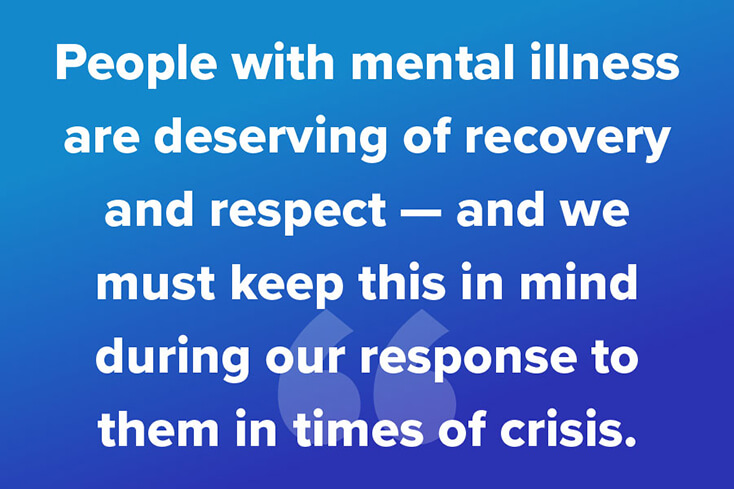
When the police locked me in a cell, following the weeks I spent on the street, I thought I was entering a dream world. After abandoning my job due to psychosis and wandering alone in a delirious state, I simply appreciated the tray of food I was given. I didn’t realize where I was. But for a moment, I could catch my breath.
I didn’t know that the iron bars wouldn’t provide the safety I was looking for. The hallucinations kept coming, and I was shackled and left to wait for trial in a Chicago jail. For an entire year. Now, as I look back on my situation and other stories of incarceration, I hope to educate law enforcement and the public on a better approach to mental health crisis response. The bottom line? People in crisis do not belong in jail.
My parents originally called the police department when they couldn’t find me in Chicago. My medication had stopped working, and I was wandering the streets. Now, as a mental health advocate, I know it is common for families to reach out to law enforcement for help when their loved ones experience a mental health crisis. In return, many are rebuffed with excuses from police who say they can’t be involved. In the most tragic cases, the loved one they hoped to save dies at the hands of police.
Since my time in jail, I have helped train the same police department that caged me within its walls. Specifically, I’ve been a panelist in crisis intervention training through NAMI Chicago.
If officers better understand what is happening to someone experiencing a mental health crisis, they can take an informed approach when responding to a call. They also need to understand the consequences of holding someone with severe mental illness in a jail cell — how it can impact them for years to come. This knowledge could change everything.
During training, you can hear the passion some officers have to better handle mental health crises. In others, you hear hesitation. It becomes obvious that what is right doesn’t obviously intersect with what is procedure. I get a sense that the very best insight we give contradicts training they’ve received before.
An arresting officer faces complicated decisions. And the future of a human being rests on that officer making the right one. Do I take them to the hospital or to the jail cell? Should I book them or do I call a doctor, a social worker? These estimations determine the outcome of the person in crisis.
In many ways, we are asking police officers to play doctor and social worker, while still balancing the scales of justice. In critical moments, it is up to an officer to decide what justice will be. And if they have no background in mental health, the easiest response is a jail cell.
While speaking up and making educational strides is important, real impact requires more legislation on the topic. Policing as we know it has to evolve with the concerns of humanity (perhaps in the direction of leaving crisis response to community supports). It has to evolve with what we know about health and crisis.
Models like CAHOOTS in Oregon, in which a mobile crisis response team consisting of a medic and a crisis worker are dispatched by a non-emergency number, are a good place to start. We need the involvement of well-staffed and well-advertised psychiatric services. And perhaps most importantly, we need more space in treatment facilities.
After almost a year as a panelist in crisis intervention, I have learned one golden lesson: If you are a police officer, and you are wondering what to do, the best response is to leave it up to a doctor, not a judge or prosecutor. Take them to a community facility to receive care, and leave it to the professionals.
Until the police are relieved of these situations, as they should be, we have to diversify an officer’s toolbox — to inform them of decisions they can make for the better. To enable them to make healthy decisions with their authority. Ultimately, a punitive system cannot be the answer to a national mental health crisis. The jail cell cannot be the response to things we don’t understand.
People with mental illness are deserving of recovery and respect — and we must keep this in mind during our response to them in times of crisis.

